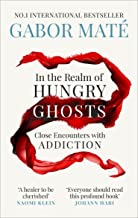
ISBN 978-1-78504-220-1, £9.99, Dr Gabor Maté, Vermilion
If there was ever a book capable of gauging a practitioner’s limits of ability, tolerance or appetite to partake in a client’s struggle then Hungry Ghosts is it. Author Gabor Maté is that rare human being able to evoke not only a powerfully dispassionate analysis of stress, addiction and mental illness, but also a compelling, impressive, very real argument that governments have, quite frankly, lost their way.
A Jewish infant, born in January 1944, two months before the Nazi occupation of Hungary, Maté has first-hand experience of what it means to be in an environment where the product of stress is exhibited. “The day after the Nazis marched into Budapest…my mother called the paediatrician and said ‘Would you please come and see my son, because he’s crying all the time.’ And the paediatrician said ‘Of course I’ll come, but I should tell you all my Jewish babies are crying.’”
This snippet of history – part of an absorbing, hour-long collection of interviews (https://www.democracynow.org/2012/12/25/dr_gabor_mat_on_the_stress) with Maté – is essential listening if the reader is to fully grasp the background and significance of this great man’s work. His own development of attention deficit disorder (ADD), for example, is pivotal to his central hypothesis that such a diagnosis, and that of depression and anxiety, are not genetic problems but rather a result of the brain’s circuitry being impaired.
Early adversity, in other words, damages people. It sounds obvious and axiomatic, but just as a University of Cambridge report in 1997 confirmed that red deer experience fear and suffer physiologically after being chased by hounds, science is often needed to make such facts irrefutable. And Maté has this in abundance.
Retired now, but for 12 years a physician in Vancouver’s Downtown Eastside, Maté regularly came into contact with “the insulted and the injured”. His patients included hard-core drug addicts, but instead of asking ‘Why the addiction?’ in their presence, he asked ‘Why the pain?’
This bold, empathic (radical to some) method had the effect of affording dignity to a group of people misunderstood, socially ostracised and shown contempt. For addiction “is a sign, a signal, a symptom of distress” in the words of Alice Miller and drugs act as an emotional anaesthetic, an “antidote to [that] frightful feeling of emptiness”.
Maté is not afraid to define this emptiness. It is a fundamental discomfort with the self. It is being abandoned by one’s mother. It is dislocation and despair. It is witnessing and suffering violence and abuse. It is knowing that the pseudo-connectivity of our technological age cannot replace trust and love.
Human beings are born prematurely compared to other mammals, Maté asserts – the uterus replaced by the environment. This means that one’s early years are critical if one is to thrive. Society still doesn’t get this. And so addicts are pilloried instead.
All hail Maté for his insightful prowess, compassion and small glimmer of hope in the form of neuroplasticity.
—
This review was first published in Private Practice, June 2019 issue, © BACP